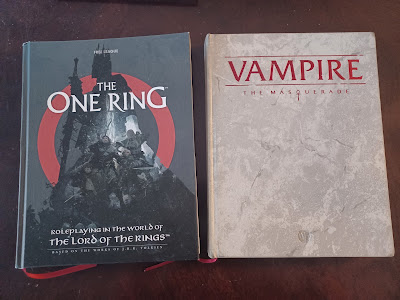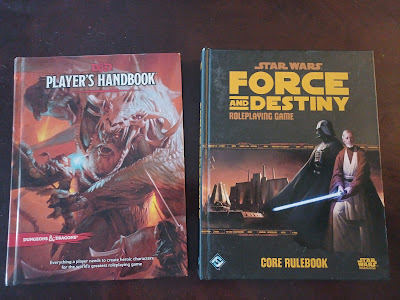the semifinals:
The One Ring vs Vampire: the Masquerade (5e)
and
Star Wars: Force and Destiny vs Dungeons & Dragons (5e)
initially, I imagined this could be a short post, even with the two matches put together. I'll do my best to be concise. it may not be easy.
for most of the prior match-ups, I had decently strong feelings about the winners. all that changes now. these are the four best RPGs I've ever played. to decide between them is going to be an arbitrary, subjective, and pointless endeavor. that is what it means to model a summer-autumn-almost-winter writing project on the Tournament of Books. (sidenote: the 20th annual ToB itself is very nearly underway! the shortlist of 16 was just recently posted.)
as I pondered this next step in the tournament (inbetween grading final projects and exams and such earlier this week), I thought back on my approach during the opening round, to my not-really-a-rubric, and I tied my brain into knots figuring how to quantify my sense of these games' mechanics, aesthetics, and user-friendliness. while I'd sketched out the rubric categories, I never gave them a metric. am I measuring out of 5 stars? percentage points? some other nice round number of cute somethings?
I re-read my past reviews, hoping to distill the elements I most value in an RPG and build some useful yardstick out of it. obviously, design is important to me, both aesthetically and in terms of user-friendliness. overall style and world-vibes are important, too-- I clearly go more for fantasy than for sci-fi, more for glowing heroism than for grim dystopias. (Vampire seems a glaring exception on this though. hmm...)
additionally, I value vividness, simplicity, and consistency (not just in games but in most art, now that I think about it). I have the most fun in games that gives me nicely-defined frameworks, clear rules, and then practically infinite freedom to invent within that space. is there a more apt way to describe that? not just the logistics of it all, but the feeling? a feeling of sinking all your imagination into a marvelous, immersive vision but also having the power to make it new and yours? I hope that makes sense to at least somebody.
RPGs are especially tricky to judge because they are more than the sum of their published material. they are not static boxes; so much depends on the storyteller, the game master, not to mention the other players. if I were to judge these four in terms of how much I loved my past gameplay in each system, that might be somewhat easier. but that's not exactly what I'm trying to do here.
nor am I comparing them merely on which story or world I might like best. it is interesting that three of these four are games live solidly within circumscribed gameworlds based on pre-existing lore. D&D is the exception, and even it has more than half its roots in the fantasy of Tolkien, so. that these four have come so far mean that such specific worldbuilding feeds into the sense of vividness and definition I value so much.
alright, alright-- I'll quit stalling. here we go.
The One Ring vs Vampire: the Masquerade 5e
for months I have worried that Vampire would end up against The One Ring in the final round; both were strong contenders all along, but now here they are, one fated to force the other out of the running.
Vampire has years ago earned my steadfast affection, for whatever reasons (see its prior match-up reviews for more on that), and contrarily The One Ring
is a newcomer in my life.
they
are so different, aesthetically and mechanically. for approachability
I'll rank them as equals. both have plenty of depth and complexity, all
made passably navigable with lovely book design. isn't it interesting their covers match so well? black and white and red, with barely-there serifs on those elegantly bold all-caps titles. not many RPG books come with fancy bookmark ribbons, but these both do.
The One Ring sells itself as "rules-light," which is a point in its favor given my preference for simplicity. skimming the book the other day, I did question this label a bit though. there are plenty of rules and guidelines for an epic, detailed, highly-managed roleplaying campaign, even if those rules are designed to sit in the background and let narrative take the stage.
the striking style of Vampire feels incomparable to me, which is a point or two in its favor. but you all heard me gush about The One Ring's
design. that's what makes this so difficult a match. which artfully
drawn style is the best one, for me, today? the glossy, bloody, immortal
danger of the urban fantasy plot? or the warm, antiqued, semi-rustic
valor of the high fantasy adventure?
I still can't decide.
-
now I've written the rest of this post and proofread it twice, still struggling to make up my mind. The One Ring is gorgeous, and simple, and it ticks so many boxes for the kinds of stories and worlds I love to consume. I really hope I get to play it again in the near future, to explore it more as a full game.
and Vampire is so evocative and unique. as I've explained before,
how often do we get a framework to fight against ourselves, to struggle
for a lost humanity? it's so interesting and novel to me, despite (and because of?) the potential discomfort and challenge of its dark, gritty, violent settings.
in a truly infuriating Tournament-of-Books-esque manner, I think I'm going to give up on reaching a judgement via all these relevant, fundamental aspects of the two, and grasp desperately at something-- anything-- for which I can easily pinpoint an obvious preference. if I had to choose just based on the two books' covers, for example, Vampire would win. that faux marble look and the shiny embossed title-- it's perfect.
but doesn't that seem so cheap and superficial? I don't hate The One Ring's cover, even if its use of red strikes me as garish. almost to make up for that stark and somewhat depressing first impression, The One Ring has buckets of marvelously good art in the rest of its pages-- all those chapter spreads, the little ink-scraped edging around the call-out boxes, the sepia sketches here and there. it's so neat and fitting and cohesive.
so.
I think that's it-- the deciding factor. after helplessly trying to compare blood-red apples to elf-grown oranges all day long, I'll choose The One Ring for its artistic and stylistic consistency. that, and the timeless allure of high fantasy.
Star Wars: Force and Destiny vs Dungeons & Dragons (5e)
where to begin? I love both of these games. I've played the one more than the other in terms of hours at the table, but I'm tempted to say my Star Wars roleplaying took on a quality that could easily outpace the more casual kind I have often tended toward in my quantity of D&D gameplay.
how much does that matter?
it matters as much as I decide that it does, I suppose.
in terms of aesthetics, neither of these games knocks my socks off entirely. the on-paper designs of each feel equally solid, good but nothing exquisite.
D&D has the simpler mechanics, I think: simpler character creation, fewer charts to reference, and more straightforward dice. altogether it's not more than a few fractions of a point simpler, but it's something.
on the other hand, Star Wars has the more defined world. playing as a Star Wars character has been some of the most vivid, immersive roleplaying I've ever done. perhaps the existence of all the films helps with that, providing my brain with so much visuality to remix. perhaps it's "limits are possibilities" at work once again. Star Wars is a certain kind of story with preset rules and rhymes. that framework and direction help my style of creativity a heck of a lot.
so how do we weigh the merits of a whole multiverse of magical realms and adventure against those of a vast galaxy full of pseudo-magical, destiny-rich alien interactions? which one, for me, today, should win?
relative simplicity and fantasy win again, it seems. if I must-- and in this case I must-- I pick dragons and
treasure and potions and spells over any number of futuristic laser swords and spaceships. it isn't fair, but it is my verdict.
next up, the final finals:
The One Ring vs Dungeons & Dragons




No comments:
Post a Comment